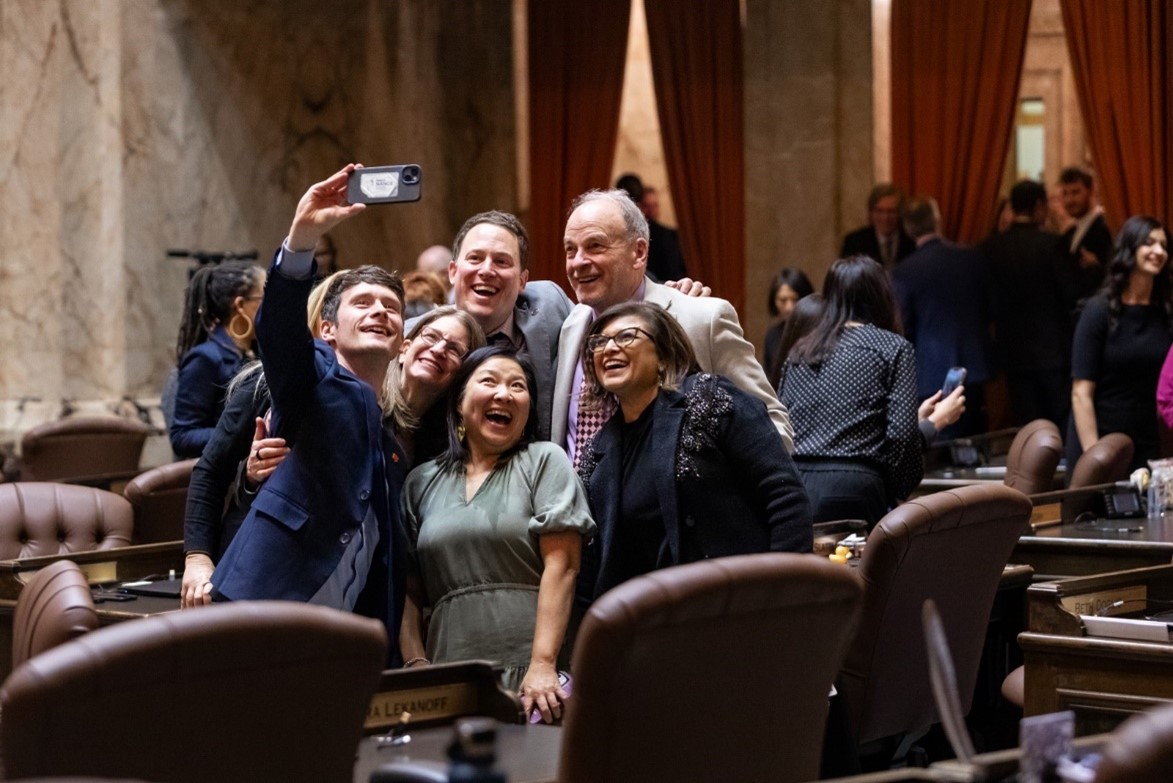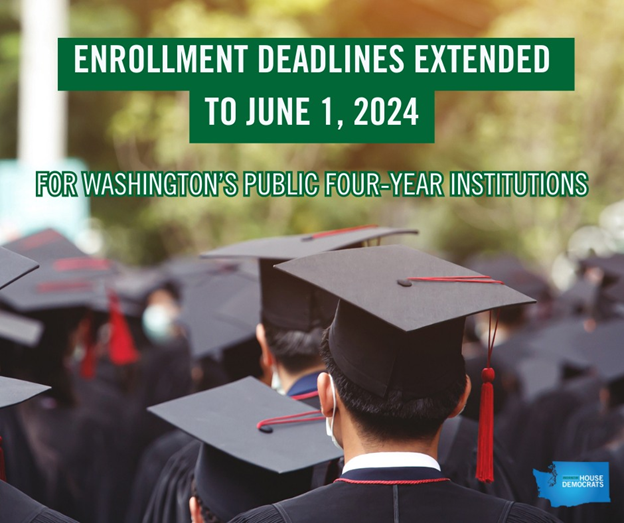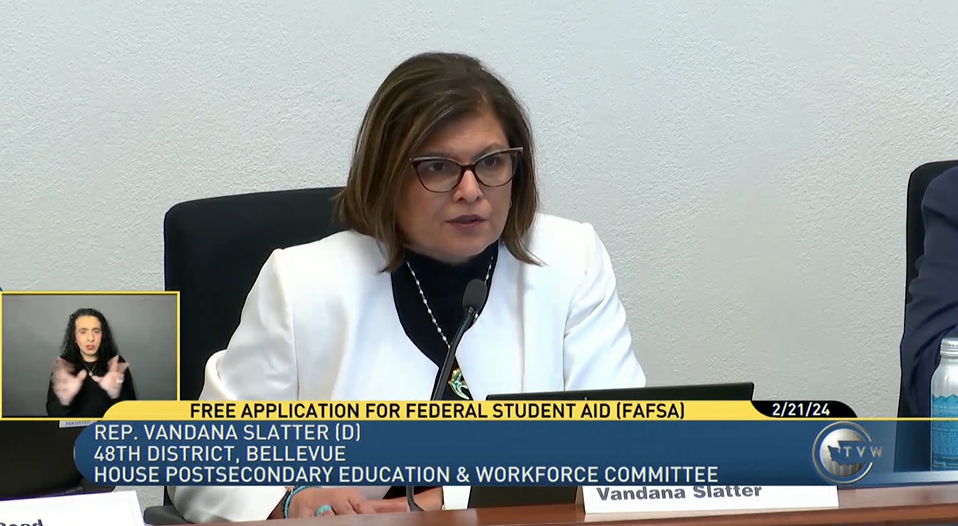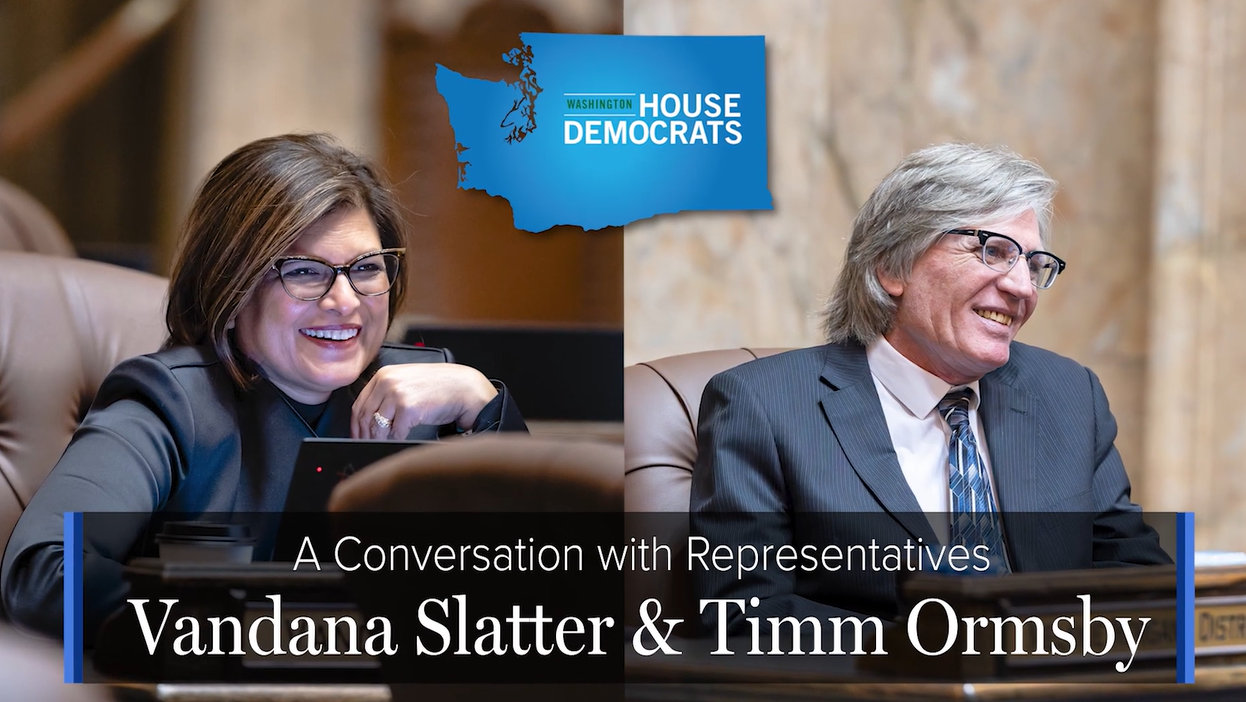Dear Students and Parents,
Last Thursday marked the last day of the 2024 legislative session. This year, we’ve passed 373 bills, with 236 receiving unanimous votes, and 297 bills passed with bipartisan support at 80% support or greater. A full update of our cumulative work will be coming to your mailboxes soon!

As Chair of the House Postsecondary Education and Workforce (PEW) Committee, I wanted to provide an important update after hearing concerns from parents and students regarding the delays impacting the processing of Free Application for Federal Student Aid (FAFSA).
What is FAFSA and why the delay?
Put simply, it is an application form for federal grants, work-study funds, and loans that represents a crucial first step toward an affordable degree or credential, especially for students from low-and middle-income families. Unfortunately, this year’s implementation of a simplified FAFSA form encountered unforeseen delays in transmitting student data to institutions for financial aid packaging.
FAFSA Delay Response and Support
On February 21st, the PEW Committee held a work session updating the legislature on the revised FAFSA process and to identify steps to support Washingtonians in accessing a postsecondary education.
To hear more about the work being done to address this issue from the Council of Presidents and State Board for Community and Technical Colleges, please listen to our recent work-session or click the image above.
Timeline and Impact of Delay
- December 30th, 2023: The Department of Education soft launched a revised FAFSA form.
- January 2024: The Department of Education identified an inflation error resulting in at least a six-week delay in student data transfer and impacting an estimated $1.8 billion in student aid.
- Late March – April 2024: Expected delays to this timeframe in the packaging of student aid by Washington’s higher education institutions, which typically begin financial aid processing in November.
The Bottom Line
 June 1, 2024: To ensure informed decision-making for students, Washington’s public four-year institutions have extended their enrollment decision deadline to June 1st. This provides students with additional time to consider financial aid offers before committing to a university. Institutions are also actively conducting outreach to impacted students and exploring solutions to address processing delays, including potentially increasing their financial aid workforce. For more information, click here for a comprehensive update and resources from the U.S. Department of Education.
June 1, 2024: To ensure informed decision-making for students, Washington’s public four-year institutions have extended their enrollment decision deadline to June 1st. This provides students with additional time to consider financial aid offers before committing to a university. Institutions are also actively conducting outreach to impacted students and exploring solutions to address processing delays, including potentially increasing their financial aid workforce. For more information, click here for a comprehensive update and resources from the U.S. Department of Education.
Understanding Budgets with Chair Ormsby
Being a House Representative is akin to being part of a diverse team united by a common goal: serving the people. Last week, I had the privilege of engaging in a candid conversation with Rep. Timm Ormsby, Chair of the Appropriations Committee, which is responsible for the states’ Biennial and Supplemental Operating budget.
This year’s Supplemental Operating Budget includes many priorities for the 48th legislative district. Meaningful investments include $335 million for K-12 education, $25 million for behavioral health, $215 million for fentanyl and opioid response, $444 million for public health, $135 million for higher education, $230 million for housing, and $335 million in climate, clean energy, and natural resources.
The Supplemental Operating Budget exists alongside two other important budgets: the Capital/Construction and Transportation budgets. This year, the Supplemental Capital/Construction Budget represents a spending plan to improve infrastructure and public facilities across the state including schools, mental health services, and affordable housing. To see what projects received funding in the 48th legislative district, visit the state’s fiscal website and select the 48th LD as your district.
The Supplemental Transportation Budget also tackles infrastructure needs by focusing on ferry upgrades, maintaining aging infrastructure such as bridges, improving road safety, repairing fish passage barriers, and funding electrification of multi-modal transit systems. To view transportation projects in the 48th legislative district, visit the fiscal website for the transportation budget and select the 48th LD as your district. In my upcoming newsletter, I look forward to providing more detail on funding in all three budgets!
To better understand the budget process, please join me in visiting with Chair Ormsby to learn about his motivations for public service and his approach to budgeting.
Washington continues to lead the charge in safeguarding reproductive rights and maintaining access to healthcare. Last year, we passed a first in the nation law, House Bill 1155, which was reported on by the Associated Press recently. The law pioneer’s stronger data protections for Washingtonians.
Additionally, we passed legislation such as House Bills 1954 and 2115 to protect healthcare providers who are providing healthcare for their patients. We also funded resources for menstrual products for construction workers through House Bill 2226 and funded vending machines with emergency contraception on college campuses. Together, these and other efforts reinforce our commitment to reduce barriers to reproductive care, reducing healthcare costs, and ensuring people have access to care when and where they need it.
Please stay tuned for further details on the budgets and bills passed this session, in upcoming communications. Thank you for reading this newsletter, for your engagement with my office, and for all you do.
In Service,

State Representative Vandana Slatter


